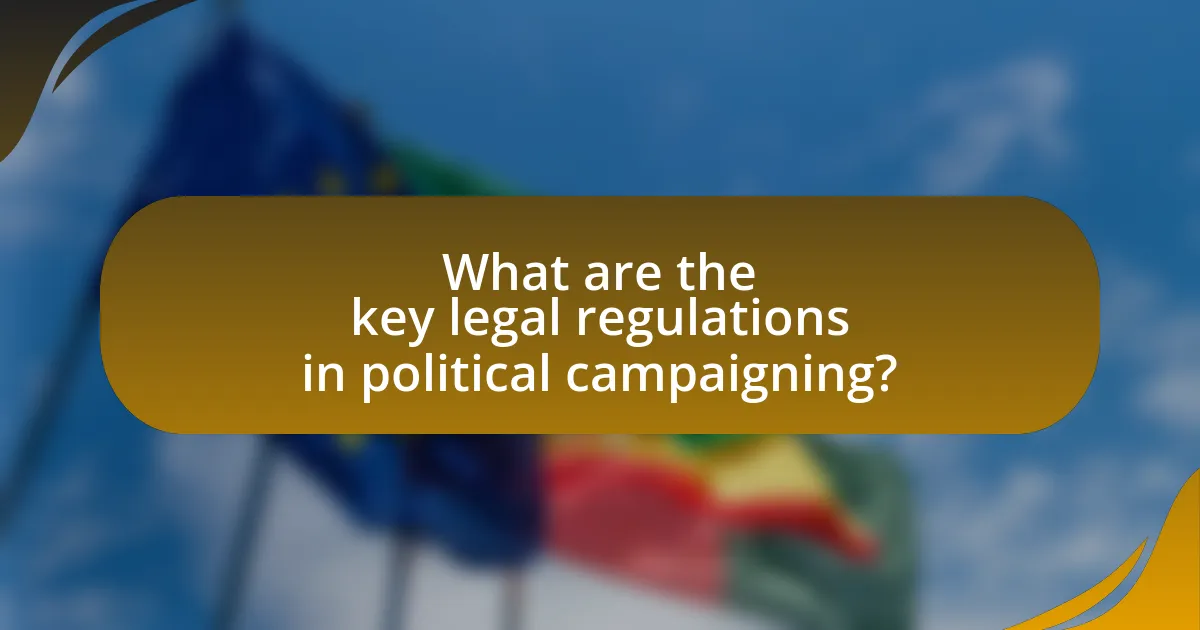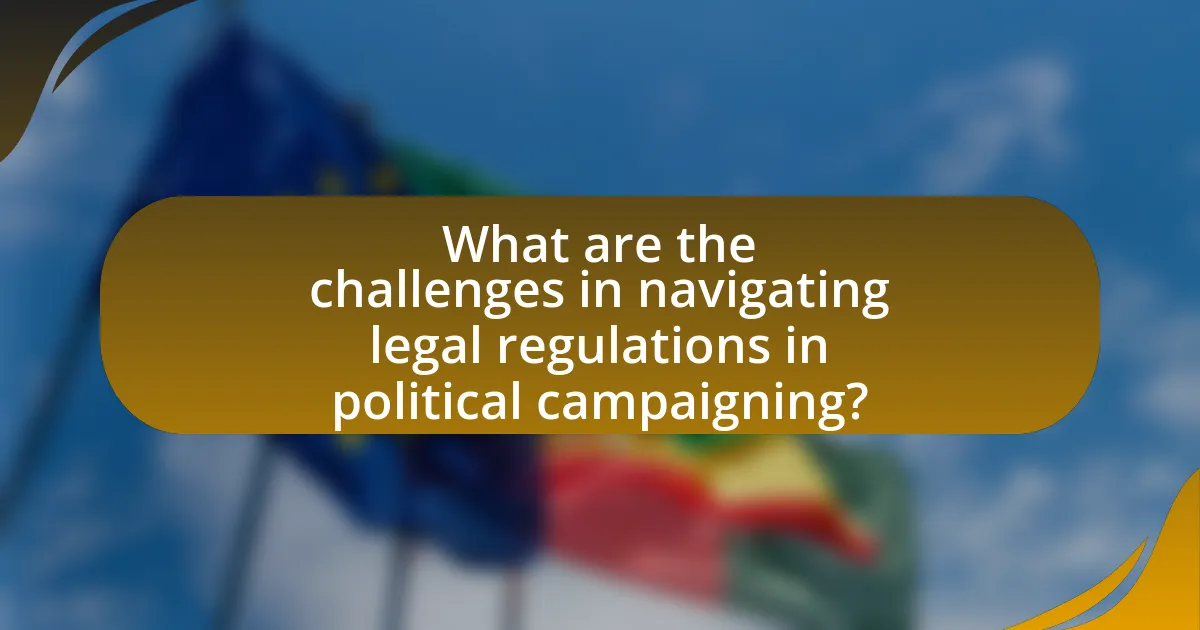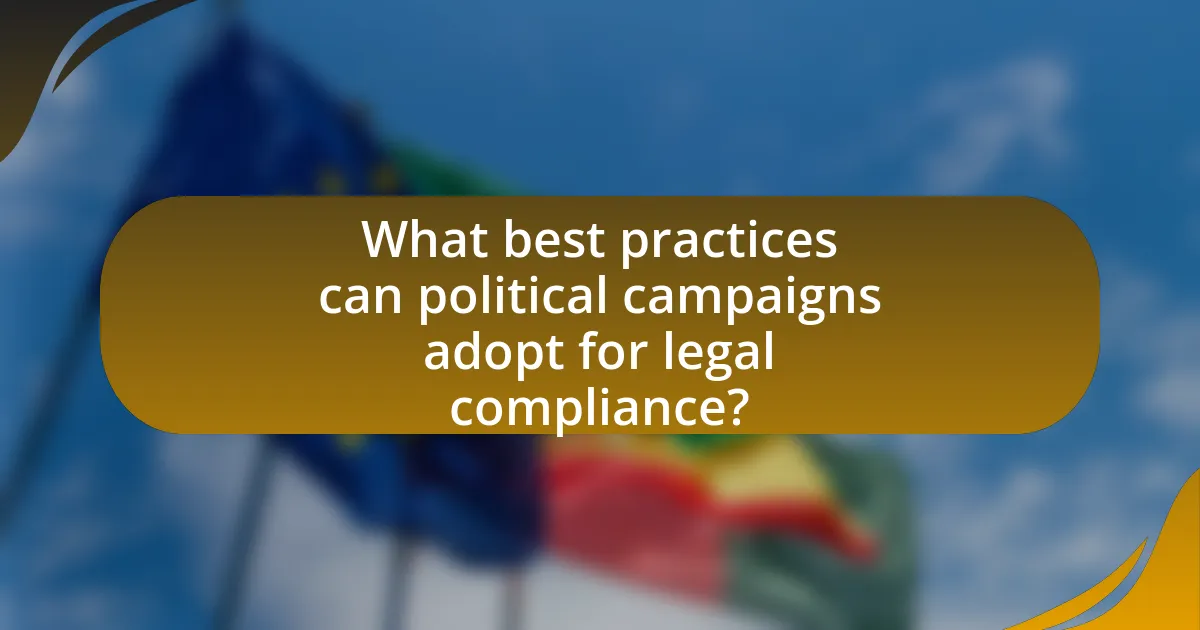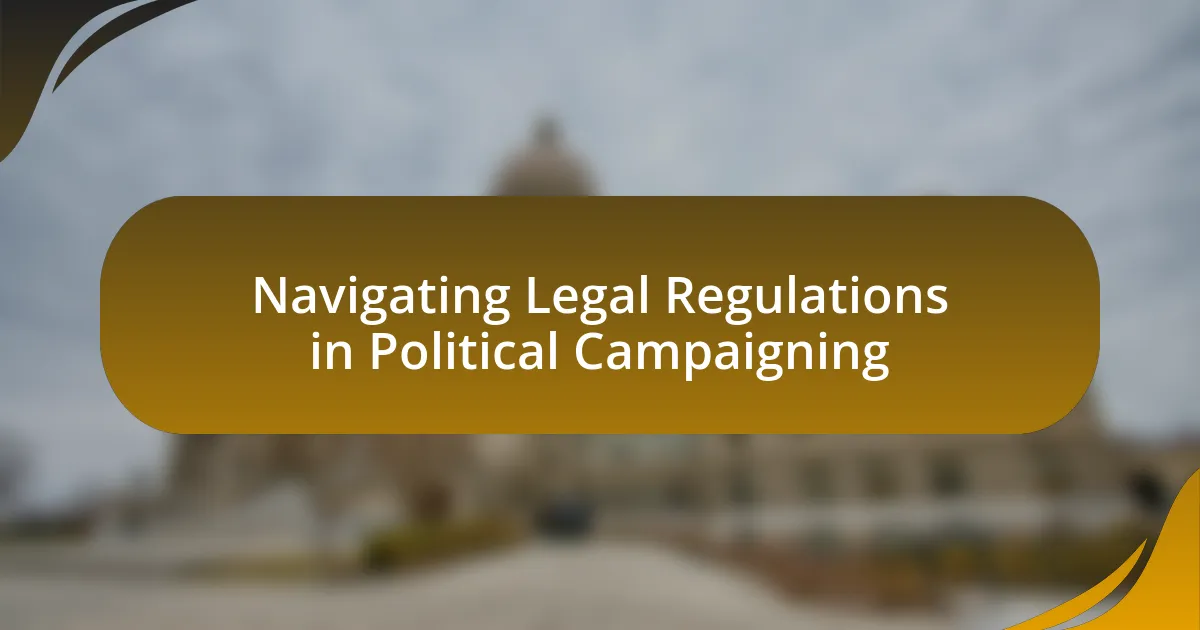The article focuses on the key legal regulations governing political campaigning, primarily in the United States, highlighting the role of the Federal Election Commission (FEC) and significant laws such as the Federal Election Campaign Act and the Bipartisan Campaign Reform Act. It discusses how federal and state laws impact campaign financing, advertising, and candidate conduct, emphasizing the importance of compliance to ensure transparency and accountability in the electoral process. Additionally, the article addresses the challenges campaigns face in navigating varying regulations, the consequences of non-compliance, and best practices for maintaining legal adherence, including the role of legal experts in mitigating risks.

What are the key legal regulations in political campaigning?
Key legal regulations in political campaigning include the Federal Election Commission (FEC) rules in the United States, which govern campaign finance, advertising disclosures, and contribution limits. These regulations require candidates to report contributions and expenditures, ensuring transparency and accountability. For instance, the Bipartisan Campaign Reform Act of 2002 established stricter rules on the financing of political ads and limited the influence of soft money in campaigns. Additionally, state laws may impose further restrictions on campaign activities, such as voter registration processes and electioneering communications. These regulations collectively aim to maintain fair electoral processes and prevent corruption in political financing.
How do federal laws impact political campaigns?
Federal laws significantly impact political campaigns by regulating campaign financing, advertising, and candidate conduct. The Federal Election Commission (FEC) enforces laws that limit contributions to candidates and political parties, ensuring transparency and fairness in the electoral process. For instance, the Bipartisan Campaign Reform Act of 2002 restricted the use of soft money in federal elections, which previously allowed unlimited contributions to political parties. This law aimed to reduce the influence of wealthy donors and special interest groups, thereby promoting a more equitable campaign environment. Additionally, federal laws mandate disclosure of campaign contributions and expenditures, which enhances accountability and informs voters about potential influences on candidates.
What are the main federal laws governing political contributions?
The main federal laws governing political contributions are the Federal Election Campaign Act (FECA) and the Bipartisan Campaign Reform Act (BCRA). FECA, enacted in 1971 and amended several times, regulates the financing of federal elections, including limits on contributions and requirements for disclosure of campaign finance information. BCRA, passed in 2002, further restricted the use of soft money in federal elections and imposed stricter rules on the financing of political advertisements. These laws are enforced by the Federal Election Commission (FEC), which oversees compliance and transparency in political contributions.
How do federal regulations affect campaign advertising?
Federal regulations significantly shape campaign advertising by imposing rules on funding, disclosure, and content. The Federal Election Commission (FEC) enforces laws that require candidates and political committees to disclose their campaign contributions and expenditures, ensuring transparency in the funding sources for advertisements. For instance, the Bipartisan Campaign Reform Act of 2002 restricts the use of soft money in federal elections and mandates that all political advertisements include disclaimers identifying their sponsors. These regulations aim to prevent corruption and promote fair competition in the electoral process, as evidenced by the FEC’s enforcement actions and the legal precedents established in cases like Buckley v. Valeo, which affirmed the government’s interest in regulating campaign finance to maintain the integrity of elections.
What role do state laws play in political campaigning?
State laws significantly regulate political campaigning by establishing rules for campaign financing, advertising, and voter outreach. These laws dictate the permissible sources and amounts of campaign contributions, ensuring transparency and accountability in political funding. For instance, many states require candidates to disclose their financial contributions and expenditures, which helps prevent corruption and promotes fair competition. Additionally, state laws govern the timing and content of campaign advertisements, often imposing restrictions on misleading information. This regulatory framework varies by state, reflecting local political cultures and priorities, thereby influencing the strategies candidates employ during their campaigns.
How do state regulations differ from federal laws?
State regulations differ from federal laws primarily in their scope and authority, with state regulations governing specific local issues while federal laws apply nationwide. For instance, states have the power to enact laws related to campaign finance, voter registration, and election procedures, which can vary significantly from one state to another. In contrast, federal laws, such as the Federal Election Campaign Act, set baseline standards for campaign finance and election conduct that all states must follow. This distinction is evident in the fact that some states allow same-day voter registration, while others do not, showcasing the variability in state regulations compared to the uniformity of federal laws.
What are common state-specific requirements for campaign financing?
Common state-specific requirements for campaign financing include registration of campaign committees, disclosure of contributions and expenditures, and limits on individual contributions. For instance, many states mandate that candidates file regular financial reports detailing their fundraising and spending activities, ensuring transparency. Additionally, states often impose contribution limits, which can vary significantly; for example, California limits individual contributions to candidates for state office to $4,900 per election cycle, while Texas has no limit for state candidates. These regulations are designed to promote accountability and prevent corruption in the electoral process.
Why is compliance with legal regulations crucial for political campaigns?
Compliance with legal regulations is crucial for political campaigns because it ensures transparency, accountability, and fairness in the electoral process. Adhering to laws such as campaign finance regulations prevents illegal contributions and promotes equitable competition among candidates. For instance, the Federal Election Commission mandates that campaigns disclose their financial activities, which helps voters make informed decisions. Non-compliance can lead to severe penalties, including fines and disqualification from the election, as seen in cases like the 2016 campaign violations that resulted in significant legal repercussions. Thus, following legal regulations safeguards the integrity of the democratic process.
What are the potential consequences of non-compliance?
Non-compliance with legal regulations in political campaigning can lead to severe consequences, including financial penalties, legal action, and reputational damage. For instance, the Federal Election Commission (FEC) can impose fines that may reach thousands of dollars for violations such as exceeding contribution limits or failing to file required reports. Additionally, candidates may face lawsuits from opponents or advocacy groups, which can further drain resources and distract from campaign efforts. Reputational damage can deter potential voters and donors, as public perception of a campaign’s integrity is crucial for success.
How can campaigns ensure they remain compliant?
Campaigns can ensure they remain compliant by adhering to all relevant laws and regulations governing political activities. This includes understanding and following federal, state, and local election laws, which dictate campaign financing, advertising, and voter outreach practices. For instance, the Federal Election Commission (FEC) mandates that campaigns disclose their financial contributions and expenditures, ensuring transparency and accountability. Additionally, campaigns should regularly consult legal experts specializing in election law to stay updated on any changes in regulations. By implementing robust compliance training for campaign staff and volunteers, campaigns can foster a culture of adherence to legal standards, thereby minimizing the risk of violations.

What are the challenges in navigating legal regulations in political campaigning?
Navigating legal regulations in political campaigning presents challenges such as compliance with complex laws, varying state regulations, and the risk of penalties for violations. Political campaigns must adhere to federal laws like the Federal Election Commission regulations, which govern campaign financing and advertising. Additionally, state laws can differ significantly, creating confusion and potential legal pitfalls for candidates. For instance, the Bipartisan Campaign Reform Act of 2002 established strict rules on campaign contributions, and failure to comply can result in fines or legal action. These complexities require campaigns to invest in legal expertise to ensure adherence to all applicable regulations, which can strain resources and complicate strategic planning.
What complexities arise from varying state and federal laws?
Varying state and federal laws create complexities in political campaigning by establishing different regulatory frameworks that candidates must navigate. For instance, while federal law sets certain baseline requirements for campaign finance, individual states may impose additional restrictions or reporting requirements, leading to confusion and potential legal pitfalls for candidates. A specific example is the Federal Election Commission’s regulations on contribution limits, which differ from state laws that may allow for higher or lower limits, complicating compliance efforts. This inconsistency can result in candidates inadvertently violating laws, facing penalties, or needing to allocate resources to understand and adhere to multiple legal standards.
How do conflicting regulations create challenges for campaign managers?
Conflicting regulations create challenges for campaign managers by complicating compliance efforts and increasing the risk of legal violations. Campaign managers must navigate varying laws across jurisdictions, which can lead to confusion about permissible activities, such as fundraising and advertising. For instance, a campaign operating in multiple states may face different contribution limits and reporting requirements, making it difficult to maintain adherence to all applicable laws. This complexity can result in unintentional infractions, which may lead to penalties or damage to the campaign’s reputation. Additionally, the lack of uniformity in regulations can hinder strategic planning and resource allocation, as campaign managers must invest time and effort in understanding and managing these discrepancies.
What strategies can campaigns use to address these complexities?
Campaigns can address the complexities of navigating legal regulations by implementing comprehensive compliance strategies. These strategies include conducting thorough legal audits to ensure adherence to federal, state, and local laws, which helps identify potential risks and areas of non-compliance. Additionally, campaigns can establish clear internal protocols for financial reporting and contribution tracking, ensuring transparency and accountability. Training staff and volunteers on legal requirements and ethical standards further enhances compliance, reducing the likelihood of violations. Research indicates that campaigns that prioritize legal education and proactive compliance measures are less likely to face legal challenges, as evidenced by the successful navigation of regulations by numerous political organizations in recent election cycles.
How do changes in laws affect ongoing political campaigns?
Changes in laws significantly impact ongoing political campaigns by altering the regulatory framework within which candidates operate. For instance, modifications to campaign finance laws can change the amount of money candidates can raise and spend, directly influencing their campaign strategies and outreach efforts. A notable example is the 2010 Supreme Court decision in Citizens United v. FEC, which allowed for increased spending by corporations and unions in political campaigns, leading to a dramatic shift in campaign financing dynamics. Additionally, changes in voter ID laws can affect voter turnout and campaign mobilization strategies, as seen in various states where stricter ID requirements were implemented, resulting in decreased participation among certain demographics. These legal changes necessitate that campaigns adapt quickly to remain compliant and effective in their outreach and fundraising efforts.
What recent legal changes should campaigns be aware of?
Recent legal changes that campaigns should be aware of include the implementation of stricter campaign finance laws and new regulations on digital advertising. For instance, the Federal Election Commission has updated guidelines requiring greater transparency in online political ads, mandating that campaigns disclose funding sources and ad sponsors. Additionally, several states have enacted laws that limit the use of personal data for targeting voters, impacting how campaigns can strategize their outreach efforts. These changes reflect a growing emphasis on accountability and transparency in political campaigning, necessitating that campaigns adapt their practices to comply with these evolving legal standards.
How can campaigns adapt to new legal requirements quickly?
Campaigns can adapt to new legal requirements quickly by implementing a proactive compliance strategy that includes regular monitoring of legal changes, training staff on new regulations, and utilizing technology for real-time updates. Proactive compliance ensures that campaigns stay informed about legislative changes, allowing them to adjust their strategies promptly. For instance, campaigns can subscribe to legal update services or consult with legal experts to receive timely information. Additionally, training staff ensures that all team members understand the implications of new laws, which facilitates swift adaptation. Technology, such as compliance management software, can automate updates and provide alerts, further enhancing the campaign’s ability to respond quickly to legal changes.

What best practices can political campaigns adopt for legal compliance?
Political campaigns can adopt several best practices for legal compliance, including thorough understanding and adherence to federal, state, and local election laws. Campaigns should regularly consult legal experts to ensure compliance with regulations regarding campaign financing, advertising, and voter outreach. For instance, the Federal Election Commission mandates that campaigns disclose contributions and expenditures, which requires campaigns to maintain accurate financial records and file timely reports. Additionally, campaigns should implement training programs for staff and volunteers to educate them on legal requirements, thereby minimizing the risk of unintentional violations. By following these practices, campaigns can effectively navigate the complex legal landscape of political campaigning.
How can campaigns effectively track legal regulations?
Campaigns can effectively track legal regulations by implementing a systematic monitoring process that includes subscribing to legal databases, utilizing compliance software, and engaging legal experts. This approach allows campaigns to stay updated on changes in election laws, campaign finance regulations, and other relevant legal requirements. For instance, organizations like the Federal Election Commission provide resources and updates that can be integrated into a campaign’s compliance strategy. Additionally, using tools such as automated alerts from legal research platforms ensures that campaigns receive timely notifications about regulatory changes, thereby minimizing the risk of non-compliance.
What tools and resources are available for monitoring compliance?
Tools and resources available for monitoring compliance in political campaigning include compliance management software, regulatory databases, and auditing services. Compliance management software, such as ComplyAdvantage and LogicManager, helps organizations track regulatory changes and manage compliance workflows efficiently. Regulatory databases, like the Federal Election Commission’s database, provide access to up-to-date information on campaign finance laws and regulations. Additionally, auditing services from firms like Deloitte and PwC offer expert assessments to ensure adherence to legal standards. These tools collectively enhance the ability to monitor and maintain compliance with legal regulations in political campaigning.
How can campaigns stay updated on legal changes?
Campaigns can stay updated on legal changes by subscribing to legal newsletters and monitoring government websites that publish regulatory updates. These resources provide timely information on changes in election laws, campaign finance regulations, and compliance requirements. For instance, organizations like the Federal Election Commission (FEC) regularly update their guidelines and rulings, which are essential for campaigns to follow. Additionally, engaging with legal experts or consultants specializing in election law can ensure that campaigns receive tailored advice and insights on relevant legal developments.
What are the benefits of consulting legal experts in political campaigning?
Consulting legal experts in political campaigning provides essential guidance on compliance with election laws and regulations. Legal experts help campaigns navigate complex legal frameworks, ensuring adherence to federal, state, and local laws, which can prevent costly legal disputes and penalties. For instance, the Federal Election Commission (FEC) outlines specific rules regarding campaign financing and advertising; legal experts can interpret these regulations to avoid violations. Additionally, they assist in drafting contracts and agreements, protecting the campaign from potential legal challenges. Their expertise also aids in addressing issues related to voter rights and election integrity, which are critical for maintaining public trust and transparency in the electoral process.
How can legal advisors help mitigate risks in campaign operations?
Legal advisors can help mitigate risks in campaign operations by ensuring compliance with applicable laws and regulations. They provide guidance on campaign finance laws, advertising regulations, and voter outreach practices, which helps prevent legal violations that could result in fines or disqualification. For instance, legal advisors can review campaign materials to ensure they adhere to Federal Election Commission guidelines, thereby reducing the risk of penalties. Additionally, they can assist in developing internal policies that promote ethical conduct and transparency, further safeguarding the campaign against potential legal challenges.
What should campaigns look for when hiring legal counsel?
Campaigns should look for legal counsel with expertise in election law and compliance to navigate the complex legal landscape of political campaigning. This expertise ensures that the counsel can effectively advise on regulations regarding campaign finance, advertising, and voter outreach, which are critical for maintaining legal compliance and avoiding penalties. Additionally, experience with local and federal election laws is essential, as these laws can vary significantly and impact campaign strategies. Proven track records in successfully representing political entities or candidates further validate a legal counsel’s capability to handle potential legal challenges that may arise during the campaign.
What practical tips can campaigns implement for successful compliance?
Campaigns can implement several practical tips for successful compliance, including establishing a clear understanding of applicable laws and regulations, maintaining accurate financial records, and providing regular training for staff and volunteers. Understanding laws such as the Federal Election Commission regulations ensures campaigns operate within legal boundaries, while accurate financial records help in reporting contributions and expenditures correctly, which is crucial for transparency. Regular training sessions for staff and volunteers on compliance issues can prevent inadvertent violations, as evidenced by the fact that campaigns with structured compliance training programs report fewer legal infractions.
